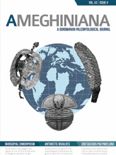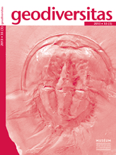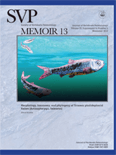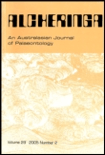
AMEGHINIANA
metrics 2024
Exploring the Depths of Paleontological Knowledge
Introduction
AMEGHINIANA is a distinguished academic journal published by the ASOCIACION PALEONTOLOGICA ARGENTINA, serving as a vital platform for the dissemination of cutting-edge research in the fields of Ecology, Evolution, Behavior and Systematics, as well as Paleontology. With its ISSN 0002-7014 and E-ISSN 1851-8044, the journal has established itself as a key reference point for scholars seeking to explore the intricate relationships within ecological systems and the evolutionary history of species. Despite not offering open access, AMEGHINIANA maintains a reputation bolstered by a Q3 ranking in both its subject categories, underlining its sustained commitment to enhancing scientific knowledge. Researchers and professionals alike benefit from this journal’s extensive archive of studies dating back to 1985, with ongoing contributions expected until 2024. With a focus on high-quality content, this journal is essential for anyone immersed in the study of paleobiology and ecological systems.
Metrics 2024
 0.39
0.39 1.20
1.20 1.40
1.40 45
45Metrics History
Rank 2024
Scopus
IF (Web Of Science)
JCI (Web Of Science)
Quartile History
Similar Journals

Swiss Journal of Palaeontology
Exploring Evolution Through Fossil InsightsSwiss Journal of Palaeontology, published by SPRINGER INT PUBL AG, stands as a leading platform for innovative research within the field of paleontology, contributing significantly to the understanding of Earth's historical life forms and their evolutionary pathways. With its ISSN 1664-2376 and E-ISSN 1664-2384, this journal has established a strong presence in academic circles, recognized as a Q1 journal in the category of Paleontology for 2023. Moreover, it ranks 20th out of 113 in the Earth and Planetary Sciences, securing an impressive 82nd percentile on Scopus, underscoring its influence and reach in the scientific community. The journal publishes cutting-edge research findings, theoretical advancements, and comprehensive reviews that span the globe, making it an essential resource for researchers, professionals, and students in the paleontological sciences. For those interested in contributing to and learning from the latest discoveries, the Swiss Journal of Palaeontology promises to be an invaluable addition to your academic library.

Arthropod Systematics & Phylogeny
Connecting genetics and systematics in arthropod research.Arthropod Systematics & Phylogeny is a pivotal journal published by the SENCKENBERG NATURHISTORISCHE SAMMLUNGEN DRESDEN, MUSEUM TIERKUNDE in Germany, dedicated to advancing the understanding of arthropod systematics, phylogenetics, and evolutionary biology. With an ISSN of 1863-7221 and an E-ISSN of 1864-8312, this journal has established itself as a reputable source for high-quality research, evident by its ranking in the Q1 category for Insect Science and Q2 in Genetics. Covering a spectrum of subjects within the realms of agricultural and biological sciences, it caters to a diverse audience of researchers, professionals, and students eager to explore the intricate relationships and evolutionary histories of diverse arthropod taxa. The journal has been consistently publishing impactful studies since its inception in 2009, with ongoing contributions expected to bolster its presence in the academic community through 2024 and beyond. Although it currently does not offer open access options, its rich content serves as a valuable resource for those passionate about entomology and genetics, fostering collaboration and innovation in an important area of biological research.

Palaeoworld
Innovating Research at the Intersection of Time and NaturePalaeoworld is a leading peer-reviewed journal published by ELSEVIER, focusing on the dynamic and interdisciplinary fields of paleontology, ecology, and stratigraphy. Established in 2006, the journal aims to facilitate the dissemination of innovative research and significant discoveries that enhance our understanding of past life on Earth. With an impressive impact factor and categorized in the second quartile (Q2) for Ecology, Evolution, Behavior and Systematics, Paleontology, and Stratigraphy in 2023, Palaeoworld stands out in its commitment to high-quality scholarship. The journal is indexed in Scopus, ranking #23 in Paleontology and #14 in Stratigraphy, placing it within the top 20% of publications in these categories. As a valuable resource for researchers, professionals, and students alike, it provides unrestricted access to cutting-edge findings, detailed methodologies, and critical assessments of paleo-environmental data. This journal is not only a repository of knowledge but also a platform for advancing discussions that bridge past ecological patterns with contemporary issues.

GEODIVERSITAS
Advancing Knowledge in Geology and PaleontologyGEODIVERSITAS, an esteemed journal published by the Museum National d'Histoire Naturelle, represents a significant contribution to the fields of geology and paleontology. With an ISSN of 1280-9659, this peer-reviewed publication has established itself as a vital resource for researchers, professionals, and students alike, disseminating high-quality and innovative research since its inception in 2002. Covering a broad spectrum of topics within earth sciences, GEODIVERSITAS not only showcases cutting-edge studies but also fosters a deeper understanding of geological and paleontological phenomena. Ranked in the Q2 category of both geology and paleontology for 2023, the journal exemplifies rigorous scholarly standards and makes significant strides in enhancing knowledge within these disciplines. With its headquarters in Paris and a commitment to scientific excellence, GEODIVERSITAS stands as a leading voice in contemporary earth science research, inviting contributions that drive forward the conversation in geology and paleontology.

JOURNAL OF VERTEBRATE PALEONTOLOGY
Exploring the Depths of Earth's Ancient FaunaJOURNAL OF VERTEBRATE PALEONTOLOGY, published by Taylor & Francis Inc, is a premier academic journal dedicated to advancing the field of vertebrate paleontology. With a strong emphasis on both traditional and innovative research methods, this journal provides a platform for the dissemination of influential studies and discoveries that shape our understanding of vertebrate evolution and their ecological contexts. Operating under an ISSN of 0272-4634 and an E-ISSN of 1937-2809, it covers research published since 1981 and aims to foster a collaborative environment for researchers, professionals, and students alike. The journal is currently ranked in the Q2 category of Paleontology, standing at position #45 among 113 in its Scopus category, which underscores its significant contribution to the academic community. As a crucial resource for scholars, JOURNAL OF VERTEBRATE PALEONTOLOGY provides insights that not only enrich academic discourse but also stimulate further research and exploration in a field that bridges biology, geology, and conservation.

ALCHERINGA
Bridging Past and Present in Paleontology and BehaviorALCHERINGA, published by Taylor & Francis Ltd, is a distinguished academic journal that has been at the forefront of research in the fields of ecology, evolution, behavior, systematics, and paleontology since its inception in 1975. With an ISSN of 0311-5518 and E-ISSN 1752-0754, this journal serves as a critical platform for the dissemination of high-quality research, contributing significantly to the understanding of biological and geological sciences. Ranking in the Q3 quartile for both Ecology, Evolution, Behavior and Systematics, as well as Paleontology, ALCHERINGA is well-positioned within the academic community, attracting submissions from researchers across the globe. The journal's Scopus ranks further highlight its relevance, particularly its position in the 51st percentile for Ecology and the 50th percentile for Paleontology. Although it does not operate under an open access model, ALCHERINGA remains committed to providing valuable insights and fostering discussions that are essential for the advancement of these vital scientific disciplines. Researchers, professionals, and students are encouraged to explore the profound implications of the studies published within, making it an indispensable resource for anyone aiming to deepen their expertise in these fields.

Palaeontographica Abteilung B-Palaeophytologie Palaeobotany-Palaeophytology
Exploring the Depths of Plant EvolutionPalaeontographica Abteilung B-Palaeophytologie Palaeobotany-Palaeophytology is a distinguished journal published by E SCHWEIZERBARTSCHE VERLAGSBUCHHANDLUNG in Germany, focusing on the intricate study of paleobotany, including the evolution and diversity of plant life throughout geological time. With an impressive Scopus ranking of #25 out of 113 in the field of paleontology, the journal is recognized for its contribution to advancing our understanding of ancient ecosystems, earning a prestigious Q2 quartile ranking in 2023. Despite its lack of open access options, the journal provides invaluable insights for researchers, professionals, and students alike who are passionate about exploring the fossil record and its implications for plant evolutionary history. The journal's collaborative nature and periodic publication schedule, ranging from 2005 to 2024, ensure that it remains at the forefront of paleontological research.

Fossil Record
Advancing Knowledge of Earth's Ancient LifeFossil Record is a prestigious open access journal pioneering the field of paleontology, published by Pensoft Publishers in Germany. Since its inception in 1998, it has provided a vital platform for the dissemination of groundbreaking research that advances our understanding of ancient life and environmental change through time. Holding an impressive Q2 quartile ranking in the field and securing a notable position among the top 73rd percentile of paleontological journals, Fossil Record ranks #31 out of 113 in the Scopus classification of Earth and Planetary Sciences. With a commitment to quality and accessibility, the journal not only encourages critical dialogue among researchers, professionals, and students but also promotes the sharing of knowledge worldwide. Explore its comprehensive repository of articles to stay abreast of the latest findings that shape our understanding of the planet’s history.

REVISTA BRASILEIRA DE PALEONTOLOGIA
Connecting Scholars to the Rich Tapestry of Earth's HistoryREVISTA BRASILEIRA DE PALEONTOLOGIA (ISSN: 1519-7530, E-ISSN: 2236-1715) is a premier academic journal dedicated to the field of paleontology, published by the esteemed SOCIEDADE BRASILEIRA DE PALEONTOLOGIA. Operating under a Q3 quartile ranking in the 2023 Scopus statistics for Paleontology, this journal serves as a vital platform for researchers, professionals, and students to disseminate and engage with cutting-edge discoveries and methodologies in paleontological studies. With a broad scope that encompasses various aspects of Earth's historical life, REVISTA BRASILEIRA DE PALEONTOLOGIA provides an essential resource for the scientific community, particularly those based in Brazil and South America. The journal is committed to promoting rigorous research and fostering collaboration among scholars, ultimately contributing to advancements in the understanding of past biodiversity and extinction events. Its thoughtful curation of articles since 2010 ensures that it remains at the forefront of paleontological scholarship, despite its limited HIndex and open access options. This journal is a crucial asset for anyone looking to deepen their understanding of evolutionary processes that have shaped our planet.

RIVISTA ITALIANA DI PALEONTOLOGIA E STRATIGRAFIA
Connecting Past and Present through GeologyRIVISTA ITALIANA DI PALEONTOLOGIA E STRATIGRAFIA, published by Università degli Studi di Milano, is a leading open access journal dedicated to the fields of Paleontology, Geology, and Stratigraphy. Established in 1979, this prestigious journal fosters the dissemination of high-quality research and innovative studies within these disciplines, holding a commendable Q2 ranking in Geology, Paleontology, and Stratigraphy as of 2023. The journal’s commitment to accessibility since 2016 underlines its objective to promote the sharing of knowledge among researchers, professionals, and students alike. With its notable Scopus rankings reflecting a solid performance in the Earth and Planetary Sciences, particularly in Paleontology and Stratigraphy, RIVISTA ITALIANA serves as a vital resource for those seeking to stay informed on the latest advancements and discoveries within the geological sciences. For further inquiries, the editorial office is located at C/O RIVISTA ITALIANA PALEONTOLOGIA STRATIGRAFIA, VIA MANGIAGALLI, 34, 20133 MILANO, ITALY.